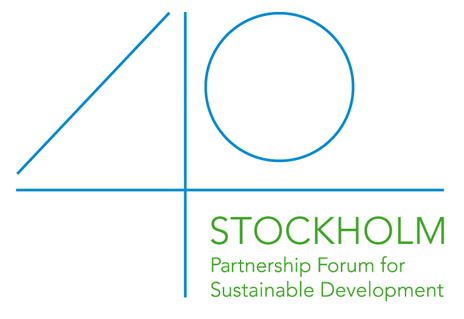The conference commemorated the 40th anniversary of the UN Conference on the Human Environment (UNCHE), and provided a forum for stakeholders from the international community to exchange ideas on sustainable development, and its challenges and solutions, with a focus on sustainable innovations, production, and living.
The resulting Stakeholder Message highlights issues for consideration by world leaders at Rio+20.
 25 April 2012: In commemoration of the UN Conference on the Human Environment (UNCHE), which convened in Stockholm in 1972, the Government of Sweden organized an international conference on sustainable living and innovative solutions, titled “Stockholm+40 – Partnership Forum for Sustainable Development.” The conference resulted in both a “Stakeholder Message” and a call to action, detailing how various actors can advance sustainable development.
25 April 2012: In commemoration of the UN Conference on the Human Environment (UNCHE), which convened in Stockholm in 1972, the Government of Sweden organized an international conference on sustainable living and innovative solutions, titled “Stockholm+40 – Partnership Forum for Sustainable Development.” The conference resulted in both a “Stakeholder Message” and a call to action, detailing how various actors can advance sustainable development.
The conference was organized by the Swedish Ministry of the Environment and Ministry for Foreign Affairs, and was held from 23-25 April 2012, in Stockholm, Sweden. It provided a platform for actors from the international community to discuss sustainable development and its challenges, as well as sustainable solutions in areas of technology, production and living. The conference focused on three main themes: sustainable innovations; sustainable production; and sustainable living.
Speaking at the opening of the conference, Sha Zukang, Secretary-General of the UN Conference on Sustainable Development (UNCSD, or Rio+20), noted that the 1972 Stockholm Conference laid the groundwork for what is known today about sustainable development, and also sowed the seeds for the 1992 UN Conference on Environment and Development (UNCED, or Rio Earth Summit). He underlined that, as emphasized by the Stockholm Conference, cooperation is key to addressing global challenges. He called for renewed cooperation among governments, communities, businesses and civil society. Sha further stressed that the Rio+20 outcome should build on the achievements of the Stockholm, Rio and 2002 Johannesburg conferences, and should reaffirm, not reverse, agreed sustainable development principles.
In the stakeholder message resulting from the conference, participants highlighted important issues for consideration by world leaders at Rio+20, including that: a green economy must ensure the promise of growth, protect the Earth’s ecosystems and contribute to poverty eradication; a sustainable economy requires a transformation of production, through, inter alia, new business models to promote resource efficiency and accountability mechanisms; an “innovation revolution” is required to achieve resource efficiency and sustainability; concerted effort is needed to live within the Earth’s social and ecological boundaries; sustainable access to water, food and energy for all can be achieved through resource use efficiency and development of research and technologies for sustainable agriculture; and sustainable development requires cooperation, partnerships and improved governance.
The Stockholm Call for Action contains a summary of the recommendations on sustainable development made during the conference. It was presented to Francisco Gaetani, Brazil’s Deputy Minister of the Environment, and Sha Zukang during the closing ceremony. The Call for Action outlines ways for governments, businesses, organizations and individuals to promote and contribute to sustainable development, including through: democratic governance and promoting human and women’s rights; integrating sustainable development and management of key resources such as water; providing incentives for sustainable innovations and production practices; and increased investment in scientific research and development. [Conference Website] [Rio+20 Announcement] [Rio+20 Secretary-General’s Statement] [Stakeholder Message] [Stockholm Call to Action]